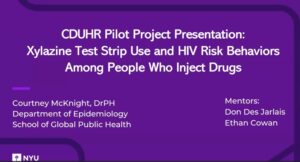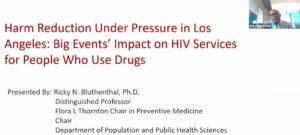Presented by: Jennifer Lorvick, DrPH; Jordana Hemberg, MPH; Madeleine George, PhD
Presentation title: Measuring Polysubstance Use with Electronic Momentary Assessment Methods
Polysubstance use is nearly ubiquitous among people who use illicit opioids, yet it is rarely examined in a way that reflects daily and hourly patterns of use. This presentation will describe a community-based study that used Electronic Momentary Assessment (EMA) methods to characterize polysubstance use in daily life, conducted with a sample of people who use opioids in Oakland, CA. The presenters will share key features of the study design and results regarding frequency, timing, and motivations for polysubstance use. In addition, they will discuss analytic opportunities and challenges in working with EMA data.
 Jennifer Lorvick is a senior public health scientist and social epidemiologist in RTI’s Public Health Research and Social Policy Department. She leads community-based, mixed-methods research focused on the health and health needs of socially marginalized populations, including people who use drugs, individuals experiencing homelessness, and women involved in the criminal legal system. In addition to observational research, Jennifer designs and evaluates community-based interventions, most recently incorporating mHealth approaches.
Jennifer Lorvick is a senior public health scientist and social epidemiologist in RTI’s Public Health Research and Social Policy Department. She leads community-based, mixed-methods research focused on the health and health needs of socially marginalized populations, including people who use drugs, individuals experiencing homelessness, and women involved in the criminal legal system. In addition to observational research, Jennifer designs and evaluates community-based interventions, most recently incorporating mHealth approaches.
Jordana Hemberg specializes in community-based and community-engaged public health research. She currently directs a National Institute on Drug Abuse–funded mixed-methods study on polysubstance use and overdose risk. Jordana joined RTI in 2017 after working as a research associate with the Alcohol Research Group at the Public Health Institute and the Integrated Substance Abuse Program at the University of California, Los Angeles.
Madeleine George is a mixed-method researcher with expertise in Ecological Momentary Assessment methods and behavioral health. She received her PhD in developmental psychology in 2017 and has worked as a Public Health Research Analyst at RTI since 2020. Broadly, her research focuses on the daily associations between social connection, health risk behaviors, and wellbeing.
Presented by: Courtney McKnight, DrPH & Ofole Mgbako, MD, MS
Presentation title: CDUHR Pilot Project Presentation Findings

 Courtney McKnight, DrPH
Courtney McKnight, DrPH
Xylazine Test Strip Use and HIV Risk Behaviors Among People Who Inject Drugs
Mentors: Don Des Jarlais, PhD and Ethan Cowan, MD, MS
 Ofole Mgbako, MD, MS
Ofole Mgbako, MD, MS
A Mixed Methods Study to Understand Sociostructural Predictors of Severe Mpox Outcomes, Intersectional Stigma, and Substance Use Among Patients with Co-Morbid HIV in NYC
Mentors: Dustin Duncan, ScD & Lisa Bowleg, PhD
Presented by: Robert Tillman, PhD
Presentation title: Renewing the Practice of Mentorship: Deepening Purpose and Practice

Mentorship is both a professional responsibility and a human relationship. This session invites mentors to step back and reflect on how they guide careers, support growth, and sustain connection across the mentoring continuum. Through an opening review of key mentoring concepts, guided reflection, and peer engagement, participants will consider how to renew their practice and bring deeper intentionality to supporting and learning alongside the next generation of scholars and scientists.
 Robert Tillman is an educator and mentor whose work has focused on advancing mentoring and professional development across the academic career span. He has designed and implemented programs that strengthen mentoring practice, support career transitions, and foster faculty and trainee success at institutions including NYU Langone, MD Anderson Cancer Center, Baylor College of Medicine, and now back at Columbia University, where he serves as Associate Vice Dean and Director of Mentoring and Advancement at the Vagelos Institute. A national NRMN Master Facilitator, Dr. Tillman has trained more than 1,000 faculty and hundreds of trainees using evidence-based mentoring approaches such as Entering Mentoring. His work emphasizes collaboration, inclusion, and sustainable systems that enhance both individual growth and organizational capacity.
Robert Tillman is an educator and mentor whose work has focused on advancing mentoring and professional development across the academic career span. He has designed and implemented programs that strengthen mentoring practice, support career transitions, and foster faculty and trainee success at institutions including NYU Langone, MD Anderson Cancer Center, Baylor College of Medicine, and now back at Columbia University, where he serves as Associate Vice Dean and Director of Mentoring and Advancement at the Vagelos Institute. A national NRMN Master Facilitator, Dr. Tillman has trained more than 1,000 faculty and hundreds of trainees using evidence-based mentoring approaches such as Entering Mentoring. His work emphasizes collaboration, inclusion, and sustainable systems that enhance both individual growth and organizational capacity.
Presented by: Sarah Laurel, Omar Peroza, Liaam Winslet, Corey DeStefano & Kevin Leyden
Presentation title: Harm Reduction Under Pressure in the Bronx, Newark and Philadelphia: Big Events’ Impact on HIV Services for People Who Use Drugs

Colectivo Intercultural TRANSgrediendo (CITG) promotes and secures the rights of Transgender, Sex Worker, and Latinx people by empowering social and cultural expression in New York. They work to strengthen the public participation of Trans and Gender Non Binary people in New York through an approach that centers gender, rights, and inclusion. They work to influence local and national public policies that guarantee full citizenship rights and the equal treatment of all people through strategies that allow studying and understanding the vulnerability that TransGNB people face in this country. Liaam Winslet is the Executive Director, and Omar Peroza is the Executive Assistant.
North Jersey Community Research Initiative (NJCRI) was founded in 1988 and is one of New Jersey’s longest-standing community-based health organizations. Each year, NJCRI provides confidential primary care, mental health support, chronic illness education, and community services to more than 20,000 individuals. Its programs are designed to promote equitable access, reduce health disparities, and strengthen overall community well-being. Corey Rosmarin-DeStefano is the Director of Clinical Operations, and Kevin Leyden is the Director of Nursing.
Savage Sisters provides the Philadelphia community with resources for those living with or affected by substance use disorder. Their outreaches advocate for disease prevention, education, and ending the stigma around addiction. Additionally, Savage provides a safe, structured, trauma-informed and pro-social living environment for people recovering from substance use disorder where they can safely recreate their lives. Sarah Laurel is the Executive Director.
Presented by: Ricky Bluthenthal, Elly Jalayer & Jen Elizabeth
Presentation title: Harm Reduction Under Pressure in LA: Big Events’ Impact on HIV Services for People Who Use Drugs

LINK TO VIDEO (Dr. Bluthenthal seminar)
 Ricky N. Bluthenthal, PhD, is a Distinguished Professor of Population and Public Health Sciences and Chair of the Department of Population and Public Health Sciences in the Keck School of Medicine at the University of Southern California. His research has established the effectiveness of syringe exchange programs, tested novel interventions and strategies to reduce HIV risk and improve HIV testing among injection drug users and men who have sex with men, documented how community conditions contribute to health disparities, and examined health policy implementation. His current studies include an observational cohort study of how cannabis legalization impacts use patterns and health outcomes of cannabis and opioids among people who inject drugs and a randomized controlled trial to test the efficacy of a single session intervention to reduce injection initiation risk behaviors among established people who inject drugs.
Ricky N. Bluthenthal, PhD, is a Distinguished Professor of Population and Public Health Sciences and Chair of the Department of Population and Public Health Sciences in the Keck School of Medicine at the University of Southern California. His research has established the effectiveness of syringe exchange programs, tested novel interventions and strategies to reduce HIV risk and improve HIV testing among injection drug users and men who have sex with men, documented how community conditions contribute to health disparities, and examined health policy implementation. His current studies include an observational cohort study of how cannabis legalization impacts use patterns and health outcomes of cannabis and opioids among people who inject drugs and a randomized controlled trial to test the efficacy of a single session intervention to reduce injection initiation risk behaviors among established people who inject drugs.
Elham (Elly) Jalayer serves as the Director of Harm Reduction at Bienestar. She draws expertise from firsthand lived experiences witnessing the devastating effects of preventable drug-related trauma. Her dedication stems from recognizing the violent consequences perpetuated by the war on drugs. Her advocacy focuses on ensuring stigma-free care, striving to safeguard people’s autonomy and well-being.
Jen Elizabeth, CTRC, is a Certified Trauma Recovery Coach specializing in childhood and sexual trauma, with a specific concentration on gender-based violence. Her 20+ years unhoused, doing survival sex work, substance use, and enduring the cycle of incarceration provides her invaluable lived experience. Much of her current work is focused on BIPOC Trans Sex Workers living with HIV.
Presented by: Patrick Sullivan, DVM, PhD
Presentation title: Public Health Implications of Adjustments to HIV Prevention and Care Funding

 Patrick Sullivan, DVM, PhD is the Charles Howard Candler Professor of Epidemiology at Emory University’s Rollins School of Public Health, and co-leads Emory’s T32 Fellowship focusing on HIV Translational Research to End the Epidemic. Before going to Emory, Patrick worked at CDC as an EIS officer and in HIV Surveillance programs, overseeing the creation of the national HIV Behavioral Surveillance System and the Medical Monitoring Project. Dr. Sullivan’s research focuses on HIV among men who have sex with men, including behavioral research, interventions, equity metrics, and surveillance, and he is a member of the HPTN MSM Scientific Committee. He is currently serving in his second term as a member of the Presidential Advisory Council on HIV/AIDS, and is the Editor in Chief of Annals of Epidemiology.
Patrick Sullivan, DVM, PhD is the Charles Howard Candler Professor of Epidemiology at Emory University’s Rollins School of Public Health, and co-leads Emory’s T32 Fellowship focusing on HIV Translational Research to End the Epidemic. Before going to Emory, Patrick worked at CDC as an EIS officer and in HIV Surveillance programs, overseeing the creation of the national HIV Behavioral Surveillance System and the Medical Monitoring Project. Dr. Sullivan’s research focuses on HIV among men who have sex with men, including behavioral research, interventions, equity metrics, and surveillance, and he is a member of the HPTN MSM Scientific Committee. He is currently serving in his second term as a member of the Presidential Advisory Council on HIV/AIDS, and is the Editor in Chief of Annals of Epidemiology.
Presented by: Sebastian Karcher, PhD & Colin Jerolmack, PhD
Presentation title: Transparency in Qualitative Research Methods

What is transparency in qualitative research and how does it contribute to methodological rigor? Drs. Karcher and Jerolmack will explain the concept of qualitative transparency, how it can be achieved and why it is important. They will also address the complex relationship between transparency and confidentiality in conducting ethical research.
 Sebastian Karcher is the Director of the Qualitative Data Repository, Director of the Center for Qualitative and Multi-Method Inquiry, and Research Associate Professor of Political Science at Syracuse University. His main research interests are in research transparency, management and curation of qualitative data, and the interaction of technology and scholarship.
Sebastian Karcher is the Director of the Qualitative Data Repository, Director of the Center for Qualitative and Multi-Method Inquiry, and Research Associate Professor of Political Science at Syracuse University. His main research interests are in research transparency, management and curation of qualitative data, and the interaction of technology and scholarship.
 Colin Jerolmack is professor of sociology and environmental studies at New York University. He is the author of two ethnographic books, Up to Heaven and Down to Hell: Fracking, Freedom, and Community in an American Town and The Global Pigeon, and he has published multiple articles and co-edited a book on qualitative research methods and ethics.
Colin Jerolmack is professor of sociology and environmental studies at New York University. He is the author of two ethnographic books, Up to Heaven and Down to Hell: Fracking, Freedom, and Community in an American Town and The Global Pigeon, and he has published multiple articles and co-edited a book on qualitative research methods and ethics.
 Ellen Benoit is an Associate Director in CDUHR’s Transdisciplinary Methods Core and a Principal Investigator at North Jersey Community Research Initiative in Newark, NJ. She conducts community-engaged qualitative and mixed-methods research on health inequities, particularly those related to HIV risk and substance use among marginalized groups.
Ellen Benoit is an Associate Director in CDUHR’s Transdisciplinary Methods Core and a Principal Investigator at North Jersey Community Research Initiative in Newark, NJ. She conducts community-engaged qualitative and mixed-methods research on health inequities, particularly those related to HIV risk and substance use among marginalized groups.
Presented by: Hiawatha Collins, Terrell Jones and additional PNNY members; Alex Bennett, David Frank & Holly Hagan (CDUHR & NYU GPH)
Presentation title: Developing Academic–Community Research Partnerships: What We Learned Doing a Collaborative, Community-Led Study on Overdose Reversals Using Naloxone

For the past two years, investigators at the Center for Drug Use and HIV/HCV Research (CDUHR) have partnered with the Peer Network of New York (PNNY) to examine overdose reversals with naloxone and to co-develop a more compassionate overdose response protocol. From project inception, we worked alongside PNNY members to shape aims and research questions, culminating in a co-designed survey instrument that peer researchers administered within their communities. Along the way, we navigated institutional hurdles—such as onboarding community researchers through CITI training—and more routine challenges, including reaching consensus on methodological choices across a relatively large, multi-institutional team. In this discussion, we report substantive findings on overdose reversals and distill lessons learned about best practices for community-based, peer-led research.
The Peer Network of New York (PNNY) started in 2010 as a pilot project with NYC DOHMH’s Bureau of Alcohol and Drug Use Prevention, Care & Treatment to connect with Peers working in harm reduction, syringe exchange programs (SEP), and naloxone distribution. The PNNY has a long-standing history of engaging with individuals and communities in the South Bronx and East Harlem, and is now a network of over 300 Peers in New York’s five boroughs and across the State. They support the work of peers across New York State through education and training, leadership development, and advocacy, recognizing that peers are most effective in fighting to save lives and reduce harm for our most vulnerable community members. Members of the PNNY who worked on the study: Hiawatha Collins, Terrell Jones, Billy. Almodovar, Marilyn Reyes, Julia James, Daniel Parker, Althea Matthews, Thomas Blazsek, Florence Craft, Ivette Chavez Gonzalez, Rachel Arana, Acxel Barboza, and Jeannette Mathews.
Alex Bennett specializes in ethnographic, historical, and mixed-methods research to address drug overdose, infectious disease, and other drug-related harm among a broad cross-section of at-risk populations, including military veterans, people who use and/or inject drugs, and those managing various forms of biopsychosocial pain. He has been involved in substance use and overdose prevention both in academic and community settings conducting research, needs assessment, program development, service delivery, and evaluation work. In his research, Dr. Bennett has focused on a wide range of psychoactives in both historical and contemporary contexts. Over the past decade, he has been working with military veterans, as partners and community health outreach specialists, to develop harm reduction programs tailored to veterans who use opioids to prevent overdose and blood-borne viral infection while simultaneously helping them access low-threshold healthcare and supportive services.
David Frank is a Medical Sociologist and Research Scientist at the NYU School of Global Public Health (GPH). His research focuses primarily on opioid use, opioid use treatment programs like Medication Assisted Treatment (MAT), and the structural and policy context in which opioid use and treatment occurs within. He is also someone who has been on methadone maintenance treatment for more than 15 years and uses those experiences in his research to produce scholarship that more accurately reflects the lives and real-world experiences of people who use illegal substances.
Holly Hagan, Co-Director of CDUHR, is a Professor Emeritus in the Department of Social Behavioral Sciences at the NYU School of Global Public Health. Trained as an infectious disease epidemiologist, Dr. Hagan’s work has sought to understand the causes and consequences of substance use disorders. Her research has examined blood-borne and sexually-transmitted infections among people who use drugs. She is an internationally-recognized expert in the etiology, epidemiology, natural history, prevention and treatment of hepatitis C virus infection among PWUD, and in 2014 her work was recognized by the US Department of Health and Human Services with the President’s Award for Leadership in the Control of Viral Hepatitis in the United States.
Presented by: Don Des Jarlais, PhD & Courtney McKnight, DrPH
Presentation title: Intertwined Epidemics, Disparate Toll: COVID-19 and the Effects on People Who Use Drugs
 Don Des Jarlais is a leader in the fields of HIV/AIDS and injecting drug use and has published extensively on these topics including articles in The New England Journal of Medicine, JAMA, Science, and Nature. He is active in international research, having collaborated on studies in many different countries. He serves as a consultant to various institutions, including the U.S. Centers for Disease Control and Prevention, the National Institute of Drug Abuse, the National Academy of Sciences, and the World Health Organization. His research has received numerous awards, including a New York State Department of Health Commissioner’s award for promoting the health of persons who use drugs. He formerly served as a commissioner for the National Commission on AIDS; as a core group member of the UNAIDS Reference Group on HIV and Injecting Drug Use; and as a member of the President’s Emergency Plan for AIDS Relief (PEPFAR) Scientific Advisory Board.
Don Des Jarlais is a leader in the fields of HIV/AIDS and injecting drug use and has published extensively on these topics including articles in The New England Journal of Medicine, JAMA, Science, and Nature. He is active in international research, having collaborated on studies in many different countries. He serves as a consultant to various institutions, including the U.S. Centers for Disease Control and Prevention, the National Institute of Drug Abuse, the National Academy of Sciences, and the World Health Organization. His research has received numerous awards, including a New York State Department of Health Commissioner’s award for promoting the health of persons who use drugs. He formerly served as a commissioner for the National Commission on AIDS; as a core group member of the UNAIDS Reference Group on HIV and Injecting Drug Use; and as a member of the President’s Emergency Plan for AIDS Relief (PEPFAR) Scientific Advisory Board.
 Courtney McKnight is a Principal Investigator specializing in mixed methods research focused on the epidemiology of drug use, opioid overdose, HIV and HCV infection. Dr. McKnight has over 20 years of experience conducting public health research related to drug use, as well as field experience as a harm reduction service provider. Prior to joining NYU, Dr. McKnight served as the assistant director of research at the Chemical Dependency Institute at the Icahn School of Medicine at Mount Sinai, where she was an investigator and project director on numerous federally funded research studies, including evaluations of syringe services programs; investigations of the drivers that contribute to disparate rates of HIV and HCV; and interventions to increase access to HIV and HCV testing and care. Her current research interests include examining the shifting landscape of illicit opioids, including the increasing prevalence of illicitly manufactured fentanyl, and risk environments of people who use drugs.
Courtney McKnight is a Principal Investigator specializing in mixed methods research focused on the epidemiology of drug use, opioid overdose, HIV and HCV infection. Dr. McKnight has over 20 years of experience conducting public health research related to drug use, as well as field experience as a harm reduction service provider. Prior to joining NYU, Dr. McKnight served as the assistant director of research at the Chemical Dependency Institute at the Icahn School of Medicine at Mount Sinai, where she was an investigator and project director on numerous federally funded research studies, including evaluations of syringe services programs; investigations of the drivers that contribute to disparate rates of HIV and HCV; and interventions to increase access to HIV and HCV testing and care. Her current research interests include examining the shifting landscape of illicit opioids, including the increasing prevalence of illicitly manufactured fentanyl, and risk environments of people who use drugs.
